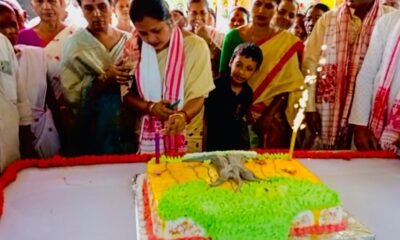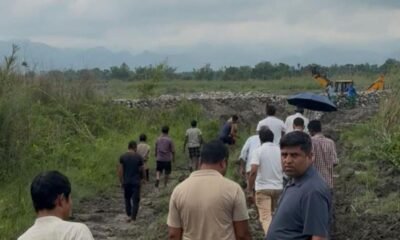Featured
Bohag Bihu Fever Grips Assam, People Welcome The Assamese New Year With Pomp And Gaiety; Amid COVID-19 scare

Edited by Sasanka Talukdar
Despite the second wave of the COVID pandemic, Rongali Bihu ( Bohag Bihu) festivities have gripped Assam and people since the morning of Thursday (the first day of Assamese New Year also called ‘Manuh Bihu’) were seen praying for peace and prosperity across the state.
Rongali Bihu also called Bohag Bihu marks a new beginning of a new year filled with love, peace and prosperity. The festival which starts in mid-April continues for a week. This year, Bohag Bihu started on April 14 and will end on April 20.
Also Read: Cows walk the ramp as part of Bihu tradition


41th Pathsala Rongali Bihu Xanmilani in association with Pathsala Public School organised folk based cultural programme held at Pathsala HS School field.
People from various places of the region took part in the programme. The bihu celebration committee also distributed Bihuwan in the field as a mark of love and respect to large number of people.The celebration committee given stress on the aged old tradition of the agricultural based celebration. The committee made arrangement for various traditional events with an aim to keep the tradition alive for the new generation.


Bihu committee informed that various artists will perform at the cultural programme including heartthrob of Assam Zubeen Garg on April 16. They appealed to the people to maintain COVID protocol which was given by the state Government.
On the other hand Bajali Police also organised cultural programme at SP office in Pathsala.Pathsala Ansolik Students union organised Mukoli Bihu at Muguria where various students took part in the programme.
Meanwhile, with Covid-19 cases surging in the state, people are celebrating the festival with all safety protocols.Last year the Covid situation in the state had put a halt to all the cultural events including Bihu celebrations.
It may be mentioned that, The Assam Health and Family Welfare Department on Friday notified Covid-19 appropriate guidelines for the upcoming Bohag Bihu and other festivals in the state in view of the fresh spike of Covid-19 cases in many parts of the country.
The notification stated that the guidelines to be strictly adhered to and followed by all the event organisers /visitors/participants of functions and other festivals in the state for the general safety and security of all participants against Covid-19.
It said that the guidelines for public gathering during the Bohag Bihu and other festivals such as Ram Navami, Ramadan, was for ensuring that people are able to celebrate their festivals with joy and simultaneously adhering to Covid-19 protocols.
The notification said the event organisers are to seek permission from the concerned district administration for organising any event resulting in public gathering.
Also Read: Man almost marries wrong woman after Google Maps leads him to wrong venue
It said all programmes/festival/events should conclude by 11 pm and all the organisers and volunteers involved in the organisation of functions and festivals must test themselves for Covid-19 three days prior to and after the event mandatorily.
For more stories follow our page Times of Northeast on Facebook, Twitter, Instagram, YouTube, LinkedIn, Koo
Visit our website https://timesofnortheast.com
Times of Northeast is an independent digital news portal which seeks to grab the attention of rational-minded people from Northeast India.
















